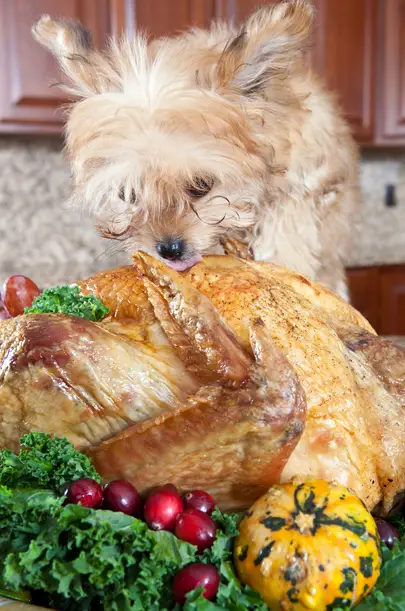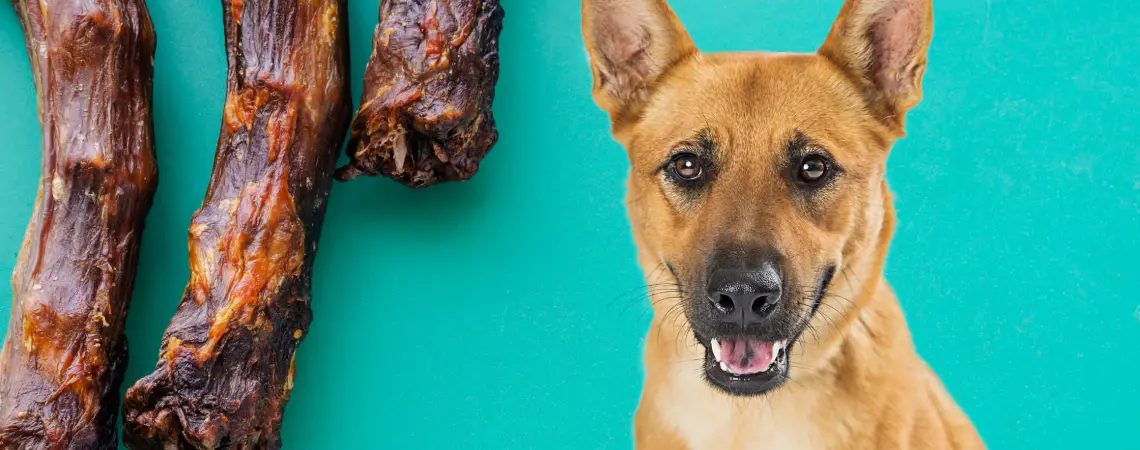There are some surprising foods which are no good for fido. So, it’s no surprised that many pet parents are confused about what is and what’s not okay to give to their dog for a treat! While most people know not to feed their dogs cooked chicken bones or turkey bone bits, not all poultry products are on the naughty list.
So, are turkey necks safe for dogs?
Yes! Turkey necks are perfectly fine for your dog, and they even have some benefits. While cooked poultry bones become brittle and shatter, causing a choking hazard, turkey necks are a different story. Turkey necks are actually quite a bit softer than cooked or raw bones. When your dog chews them, they’ll crush and turn into safe to swallow pieces.
For convenience reasons, it’s easiest to buy the freeze dried turkey neck variety. You can buy these in sealed bags on Amazon, and they’re easy to feed to your dog. However, dogs can safely eat the raw variety as well. Just be aware that they could leave bacteria on the floor, so you may want to clean up with disinfectant when they’re done if your pup is a messy eater.
This isn’t a big deal though, and offering a turkey neck alternative to raw meaty bones to your dog is a great idea, as they make excellent and healthy dog treats. Just make sure to give your dog the right bits of the bird and avoid cooked bones at all costs. (However, raw bones from poultry are just fine if you have some leftover and want to hand them over!)
Even if you don’t want to give your dog a turkey neck all the time, it’s an easy way to share your Thanksgiving feast with your pup and use all the parts of the turkey! Dogs have no problem eating cooked or raw turkey meat, the turkey’s neck, feet, turkey giblets, bone broth, and organ meats. In fact, these foods are actually good for them and provide many health benefits, so feel free to feed your dog a variety of these poultry products.
Wait, what about avoiding human foods?

While it’s true that many experts advise you to avoid human foods for dogs, that’s not quite the whole story.
Foods which we make for ourselves are often packed with salt, sugar, garlic, onion, and other items which are no good for your pup.
However, raw, or even cooked poultry with no seasonings is just fine for them. Avoid giving your pup anything which is too salty or fatty and you’ll be good to go.
In fact, many dog owners actually have placed their dogs on completely raw food diet! They eat fresh vegetables, organ meat, muscle meat, duck neck, turkey neck, chicken feet, whole eggs, and chunks of beef, chicken, or turkey on the regular, but raw feeding is a subject for another article.
However, raw dog food can be great for your pooch if you know what you’re doing. Be warned though, a raw diet for dogs is more complicated than just throwing things in a dish and if you want to go it full time, you need to do your research to avoid malnutrition on a raw fed diet. (Look for raw diet dog food recipes if you’re curious!)
What are the health benefits of turkey necks for dogs?
Turkey necks, whether raw or dehydrated, provide a high-quality protein source in your dog’s diet. Not to mention glucosamine, chondroitin, calcium, and phosphorous, which are fantastic for maintaining healthy joints, something which is important to all dogs, but especially to large breed dogs, who can easily have mobility issues and other health problems later in life.
While many pet parents choose to purchase supplements for their pet’s joint health, feeding them turkey necks or a similar food item can aid them naturally! This is particularly beneficial to older dogs that may be suffering from arthritis, but good nutrition is important for puppies as well.
Giving your dog freeze-dried turkey neck chews is also a great way to keep them occupied when you’re not home. Bored dogs are often destructive, and giving them a safe outlet for chewing can do wonders for them.
It should be noted though that turkey necks are best for medium to large size dogs because of their size.
What if I have a small breed dog?
Turkeys are pretty big animals. Commercially raised turkeys can weigh 16 pounds! That’s a big bird, and for a dog with a tiny mouth, a turkey neck might be a bit of overkill.
Don’t worry though. You can also purchase much smaller turkey necks which will be a more appropriate size for smaller breed dogs. You could also cut up fresh turkey necks yourself into smaller, more manageable pieces, or even opt to give them chicken neck or duck necks instead, which are much smaller and still doggy friendly.
What to know before giving turkey necks to your dog
If your dog is not used to eating a raw meat diet or freeze dried meat, take it slow. Diet changes which happen too fast can give your pooch a bad bout of diarrhea or vomiting. In many cases, pet parents mistakenly blame this upset on the food, which in fact, it was simply the timing.
Start out by giving them a smaller piece of turkey neck and see how it goes. Feed raw, or cooked turkey neck, a per your dog’s and your preference. If they seem to be handling it well, with no signs of vomiting or diarrhea, then you can give them turkey or chicken neck as often as 2-3 times per week, and they’ll be thrilled.
It’s also a good idea to supervise your dog when they are eating turkey necks, at least for the first few times. Some dogs can be.. over eager about eating and cause themselves issues. You may need to step in and try to curb this behavior and teach them better eating habits.
This is a good practice for anything your dog is eating though. Eating too fast can cause severe issues like bloat, so you want to stop these behaviors when you see them. For dogs that just can’t help themselves though, a slow feeder or puzzle bowl is often the way to go.
Interested in seeing what else Fido can and can’t eat? We’ve also done a few more articles on popular queries like Pumpkin Seeds, and jelly for your reading pleasure!





